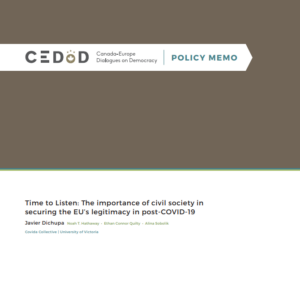Solidarity in the era of Coronavirus: Civil society and legitimacy
by Javier Dichupa, Noah T. Hathaway, Ethan Connor Quilty, and Alina Sobolik (Covida Collective) of the University of Victoria
The ongoing Covid-19 pandemic has exposed the vulner-abilities of a heavily globalized world. Supply chains are straining, economies are receding, and most of the world is now living under some form of restriction. Furthermore, governments are competing over scarce medical resources and blaming each other for their own shortcomings. Com-pounding these issues is the health-related aspect of this cri-sis, which pits public health measures against civil liberties and rights. The pandemic is eroding trust between states and damaging the relationship between governments and their citizens; therefore, hampering the response to the virus and creating sociopolitical instability.
Governments have taken extraordinary measures to combat COVID-19, though the way they are doing so could be caus-ing severe problems. These measures are fueling a decline in solidarity and trust. Domestically, Spain and Italy are begin-ning to see a breakdown of sympathy in their parliaments. Furthermore, their long and harsh lockdowns are starting to fuel contempt in the population. Though, most urgently, the lack of solidarity at the supranational level could carry nega-tive long-term implications for the European Union. The EU is heavily reliant on public opinion for its legitimacy. With trust in the EU falling in Southern Europe, this could prove very damaging for the Union’s legitimacy, not least because of the recent loss of the United Kingdom. If unaddressed, the decline in solidarity will further undermine the European project, possibly fatally.
Based on the information gathered, the optimal course of ac-tion would be to take a bottom-up approach to the crisis. By enlisting the aid of civil society organizations, governments could gain valuable information regarding public opinion. Therefore, giving governments more data to draft better leg-islation domestically. Supranationally, civil society groups could use their networks to gather consensus from across the EU. They allow governments to work together in areas where it would be easy to find a census. Involving civil so-ciety organizations into the COVID-19 response would give the people a chance to voice their concerns. This approach would increase input legitimacy and enhance the outputs governments produce. Stabilizing the EU and promoting the solidarity it needs to overcome the virus.


